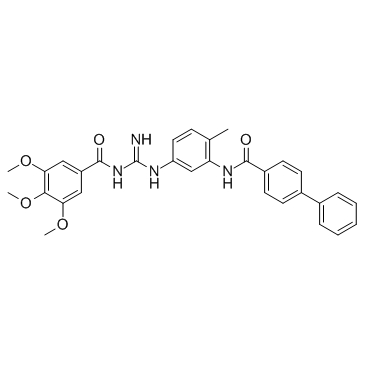1263131-92-5
| Name | N-{2-Methyl-5-[N'-(3,4,5-trimethoxybenzoyl)carbamimidamido]phenyl}-4-biphenylcarboxamide |
|---|---|
| Synonyms | N-{2-Methyl-5-[N'-(3,4,5-trimethoxybenzoyl)carbamimidamido]phenyl}-4-biphenylcarboxamide |
| Description | MRT-83 is a potent antagonist of Smo, with an IC50 in the nanomolar range. |
|---|---|
| Related Catalog | |
| Target |
Smo[1]. |
| In Vitro | MRT-83 displays full antagonist properties with an IC50 (~3 nM) for inhibiting ShhN (3 nM)-induced proliferation of rat GCPs. MRT-83 also blocks SAG (0.01 μM)-induced proliferation of GCPs (IC50 ~6 nM). MRT-83 blocks BC binding to HEK-hSmo cells in a dose-dependent manner with an IC50 of 4.6 nM. MRT-83 abrogates BC binding to cells expressing mouse Smo with an IC50 of 14 nM, which is in good correlation with its IC50 in the Shh-light2 and alkaline phosphatase assays[1]. |
| In Vivo | Animals treated with ShhN in the presence of MRT-83 are as healthy as those of the other groups but up-regulation of Ptc transcription in the SVZ of these animals is no longer observed in agreement with a complete inhibition of ShhN-mediated effects (8.7±2.4 Ptc+ cells/section, n=9) and is not different from vehicle-mediated effects. MRT-83 but not MRT-36 antagonizes the up-regulation of Ptc transcription induced by ShhN in vivo in the SVZ of the LV[1]. |
| Animal Admin | Mice[1] Four groups of six animals received 5 μL of 45% 2-hydroxypropyl-β-cyclodextrin PBS solution containing 0.9 μg of ShhN alone or in the presence of MRT-83 (200 ng) or MRT-36 (110 ng). A control group receive 5 μL of 45% 2-hydroxypropyl-β-cyclodextrin solution alone. All groups are analyzed 48 h after the injection[1] |
| References |
| Density | 1.2±0.1 g/cm3 |
|---|---|
| Molecular Formula | C31H30N4O5 |
| Molecular Weight | 538.594 |
| Exact Mass | 538.221619 |
| LogP | 5.23 |
| Index of Refraction | 1.608 |
| Storage condition | 2-8℃ |
